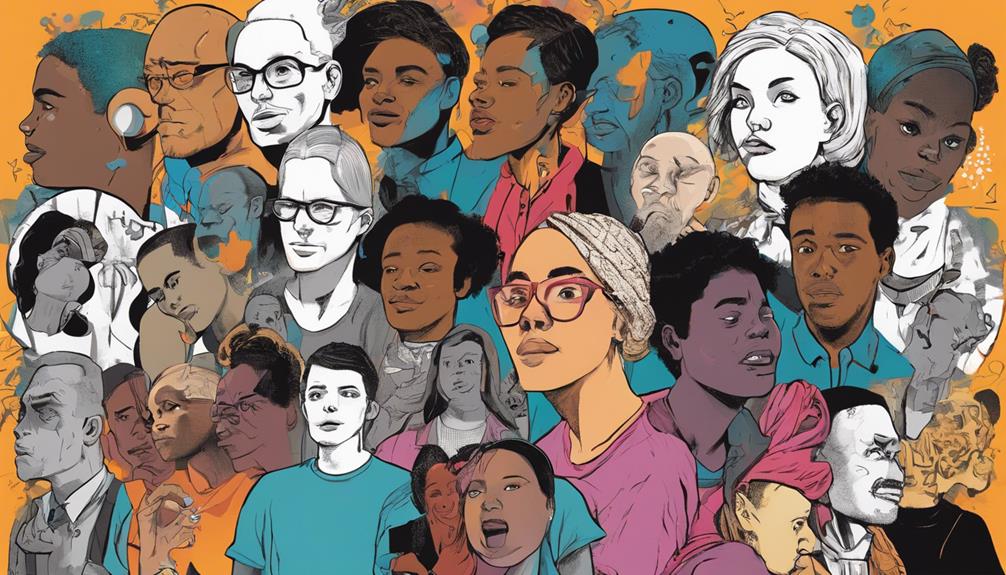Your personality holds hidden insights that can dramatically influence your life. By understanding your traits, you can align your career choices for better job satisfaction and higher income. Your daily habits and leisure preferences reflect your underlying traits, shaping your health and social interactions. Recognizing these patterns can enhance your relationships and boost your resilience during challenges. Different environments and experiences further mold your personality over time. Embracing these insights can lead to personal growth and smarter choices in various aspects of your life. Explore how letting your personality shine can transform your journey.
Key Takeaways
- Aligning your personality traits with career choices can enhance job satisfaction and income potential.
- Your personality influences health outcomes, with traits like agreeableness linked to longer life and well-being.
- Daily habits, such as grooming and social interactions, reflect your underlying personality traits.
- Leisure preferences, like social activities for extroverts and solitary pursuits for introverts, enhance overall well-being.
Personality and Career Alignment

Aligning your personality traits with your career choices can greatly boost your income potential and job satisfaction. When you match your unique characteristics with job requirements, you're more likely to excel and find fulfillment.
For instance, if you're extroverted, a role involving teamwork and social interaction might be ideal. A study of nearly 8,500 individuals highlighted that those with aligned personality traits and job demands earn higher incomes.
Consider how your college major reflects your personality; art students may show neurotic tendencies, while psychology majors often display open-mindedness. By understanding your personality, you can make informed career decisions, increasing your chances of both financial success and personal contentment in your professional life.
Health Implications of Personality

Personality traits greatly influence your health outcomes, often determining factors like longevity and overall well-being.
For instance, if you're high in agreeableness and emotional stability, you're likely to enjoy a longer life.
On the other hand, high neuroticism and low conscientiousness can lead to unhealthy behaviors, such as weight cycling and binge eating.
If you find yourself impulsive, you might struggle more with obesity.
Competitive traits can also push you toward unhealthy habits, increasing your risk of weight gain.
Understanding how your personality traits shape these behaviors is essential for making healthier choices.
Social Behavior and Personality Traits

Your personality traits greatly influence how you interact with others and engage on social platforms, shaping your social behavior in various contexts. Understanding these traits can reveal valuable insights about your social dynamics.
Here are four key aspects to evaluate:
- Extroversion vs. Introversion: Extroverts thrive in social settings, while introverts often prefer quieter environments.
- Communication Style: Your personality affects how you express yourself, whether you're assertive or more reserved.
- Social Media Habits: Extroverts share openly online, while anxious individuals may curate idealized personas.
- Music Preferences: Your taste in music can indicate your personality, with different genres resonating with varying traits.
Recognizing these patterns can help you better understand your interactions and improve your social experiences.
Political Views Shaped by Personality

Childhood temperament greatly influences adult political beliefs, shaping how individuals engage with their political systems.
If you exhibited conduct problems as a child, you might lean toward left-leaning economic views. Research shows that your early behavior can leave a lasting mark on your political ideology. For instance, if you were more rebellious, you might be discontent with authority and traditional systems.
Conversely, those who were compliant may favor more conservative views. Understanding this connection can help you reflect on your political stance and its roots in your personality.
Recognizing these patterns not only sheds light on your beliefs but also helps you engage more thoughtfully in conversations about politics.
Daily Habits Reflecting Personality

Daily habits often reveal underlying personality traits, offering insights into how individuals navigate their routines and interactions.
Your daily actions can serve as a mirror reflecting who you are. Consider these examples:
- Morning Routines: If you wake up early, you might be disciplined; if you snooze, you could be more laid-back.
- Grooming Habits: Spending time on personal grooming might indicate a detail-oriented personality.
- Eating Patterns: Healthy eating can reflect conscientiousness, while indulgence in junk food may suggest impulsivity.
- Social Interactions: How often you text or call friends can show your extroversion or introversion.
Leisure Preferences by Personality Type

Leisure preferences often reflect personality types, with extroverts gravitating towards social activities and introverts seeking peaceful, solitary environments.
If you're an extrovert, you might thrive at beach parties or group sports, enjoying the vibrant atmosphere and interactions. You likely feel energized by socializing and meeting new people.
On the other hand, if you're an introvert, you probably prefer hiking in the mountains or curling up with a good book in a quiet café. These tranquil settings allow you to recharge and reflect.
Understanding your leisure preferences can enhance your well-being, helping you choose activities that align with your personality.
Leadership Styles and Personality

Leadership styles often reflect an individual's personality traits, shaping how they motivate, communicate, and inspire their teams. Understanding your own personality can help you refine your leadership approach.
Here are four common leadership styles associated with specific personality traits:
- Authoritative – Confident and decisive, often driven by a strong vision.
- Democratic – Collaborative and open-minded, valuing input from team members.
- Transactional – Structured and goal-oriented, focusing on rewards and performance.
- Transformational – Charismatic and empathetic, inspiring change and innovation.
Resilience in Crisis Situations

Resilience in crisis situations often determines how effectively you navigate challenges and emerge stronger from adversity.
When faced with turmoil, your ability to adapt and maintain focus is essential. You might find that staying calm under pressure helps you assess the situation more clearly, allowing for better decision-making.
Embracing a growth mindset enables you to learn from setbacks, turning them into valuable lessons. Surrounding yourself with supportive people can bolster your confidence and provide different perspectives during tough times. By focusing on your own progress and priorities, you can reduce the pressure of external comparisons. Learning how to overcome fear of missing out is crucial in maintaining your mental well-being, allowing you to concentrate on what truly matters to you. Ultimately, cultivating self-awareness and resilience will empower you to navigate challenges with greater clarity and purpose.
Superstitions and Performance Boosts

Superstitions can play a surprising role in enhancing your performance by boosting your confidence and reducing anxiety in high-pressure situations. Many successful individuals, including athletes and performers, rely on rituals and beliefs to create a sense of control and focus.
Here are some ways superstitions can impact your performance:
- Increased Confidence: Engaging in a ritual can make you feel more prepared and self-assured.
- Anxiety Reduction: Familiar actions can calm nerves, leading to better focus.
- Enhanced Motivation: Believing in a lucky charm can inspire you to push harder.
- Team Cohesion: Shared superstitions among teammates can strengthen bonds and improve collaboration.
Embracing these beliefs might just give you the edge you need to excel.
Educational Impact on Personality Development

Education considerably shapes your personality development by influencing your values, social behaviors, and cognitive styles throughout various life stages.
When you engage in learning experiences, you're not just acquiring knowledge; you're also cultivating traits like openness and critical thinking.
Your interactions with peers and educators can enhance your social skills, fostering confidence and adaptability.
Different educational environments, whether formal or informal, can steer your interests and preferences, shaping your identity.
For instance, collaborative projects may boost your teamwork skills, while independent research might strengthen your self-discipline.
Ultimately, the subjects you choose and the challenges you face in education can considerably impact how you perceive yourself and interact with the world around you, guiding your personality development in profound ways.
Conclusion
By understanding how your personality influences various aspects of your life, you can make choices that resonate with your true self.
For instance, if you're an extrovert, you might thrive in collaborative work environments, leading to greater job satisfaction and success.
Embracing this insight allows you to tailor your career path and social interactions for a more fulfilling life.
So, why not start exploring these connections today and access your full potential?









